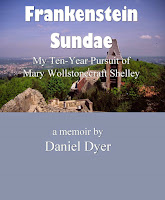The
Trelawnys left, and Mary wrote a piercing note in her journal about something
horrible—yet another horrible occurrence
in her still young life. My poor dear
Brother William Sep. 8th of Cholera—This is a sad blow to us all ….[1] He was twenty-nine.
William, Jr.
was the son of William Godwin and Mary Jane Clairmont Godwin, the woman Godwin
married a few years after Mary Wollstonecraft died. As I’ve written (much, much
earlier in this text), Mary Jane brought two previous children to the marriage
(Charles and Claire, each with a different father), and Godwin, of course, had
little Mary. So … while Mary was growing up, there were in the Godwin household
five children, no two with the same parents.
William, Jr.
was born on March 28, 1803, making him nearly six years younger than Mary.
After a fairly turbulent childhood, William, Jr. became a journalist (Morning Chronicle), and Mary encouraged
his writing. When he died, he left a novel-in-progress, Transfusion, which Mary and her father prepared for publication in
1835. The sad father wrote “Memoir of the Author,” which begins the book. He
talks about how, as a young man, my son
betrayed an unsteady and roving disposition. He couldn’t seem to settle on
what to do with his life.
Then—apparently
without telling his father—young William began writing essays. After he’d
written two, he presented to them to his father, who wrote that both of them are pregnant with striking
indications of the peculiar turn of his mind ….
Godwin, too,
notes that his son, two years before he died, started a Shakespeare Club—“The
Mulberries,” he called them; members had to write occasional essays on the
Bard.
Then—in the
most painful pages—Godwin writes about his son’s fatal illness. He reports that
he and his wife nursed their son continuously in his final days, the son that,
writes Godwin, was soon almost insensible
to the persons about him.
And he ends
his brief biography and tribute to his son with this: In the last two years of his life, he in a striking degree shook off the
errors that had occasionally clouded his earlier years, and would infallibly
have distinguished himself with honour in any career in which he had engaged.[2]
On a
personal note, I see that I read Transfusion
in July 1999—a copy that I’d acquired via Hiram College’s interlibrary loan.
Things were going on in my life then—dark
things. But I will get to that in a subsequent post. Anyway, the copy I read did
not have the memoir by his father, so
I wrote to that great Mary Shelley scholar, Betty Bennett (of whom I’ve written
a lot in earlier posts), and she, of
course, had a copy, sent me a Xerox of the relevant pages. It arrived on June
19, 1999. I still have the brief note she dashed off on her American University
letterhead: Dear Dan— As promised— Betty.



No comments:
Post a Comment